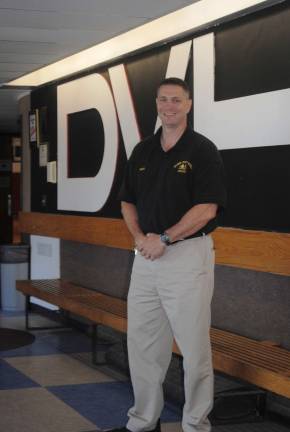DV's Officer Moglia gets to the heart of the drug problem

By Anya Tikka
WESTFALL — After witnessing the struggle many students were going through every day with drugs, Officer Mark Moglia, Chief of Police at Delaware Valley Central School, decided it was time to do something.
Moglia expanded the drug education classes at the school campus. Six years later, drug-related incidents and calls to the Westfall Police Department have gone down dramatically. The school district’s drug-related cases have leveled out to 9 to 11 cases per year, down from more than 30 per year when Moglia first started at the school.
His deep concern about his students comes from his own experience.
“I think it’s because I’ve seen what alcohol can do,” Moglia said. “My father was an alcoholic, and my mother smoked all her life.”
They both died at a young age, leaving him devastated.
He teaches two classes with other police officers on the campus: one called "Keep It Real" for seventh graders in middle school, and the other one called "Too Good for Drugs and Violence" for ninth graders at the high school.
“We talk to the kids about situations — avoiding conflict, communication, taking risks, and how there’s a consequence with every situation,” Moglia said. “We were one of the first schools in the state to implement this program in middle school,"
The word "real" in the middle school program’s name is actually an acronym:
R — Refuse
E — Explain why you want to do something
A — Avoid a situation
L — Leave
"Just take yourself out of that situation,” he explained.
Anti-drug education is offered as part of health class, with teachers Jennifer Sorensen and Dolores Brennan in the classroom. He said the kids enjoy the class.
"I tell them true stories without mentioning the people’s names," he said, "about people in the community who have been arrested for drug abuse crimes, whether buying, selling, burglaries, or robberies or whatever. I tell stories about how a person can destroy a whole family, and I see a lot of kids getting the message.”
Parental watchfulness is crucial
The Moglia's caring comes through when he talks about the different ways he reaches out to kids.
“The way to fight back is education," he said. "Drugs are a huge problem everywhere, not just here in our area. Kids are young. There are a lot of social pressures. It’s in the media, music, movies that are out there, on Facebook, Twitter, YouTube, and it’s scary the way they show kids now.”
Moglia feels parenting is more difficult today because of the mixed messages school-age kids get through the popular culture.
“Parents need to be more parents than they were 30 years ago," he said. "Today, you have to make sure they go to someone’s house, have to know what they’re doing 24 hours a day if you want to protect them. Kids may make bad choices if their parents are pretty loose.”
He said it bothers him that a lot of parents blame the school for their children's behavior.
"We’re doing everything we can do here, more than a lot of schools," he said.
Moglia wants his classes, and his office, to be a safe place where students can express themselves. He wants students to feel they can come to his office to let off steam before they turn to desperate actions — drug-taking and other destructive behavior — in response to their life situations.
“In my office, they can yell, scream, and even curse without getting into trouble,” he said.
It's a safety valve for the pressures that build up in the youngsters’ lives.
Different ages and stages
Moglia uses different approaches for different grades.
He said 90 percent of students in ninth grade and older "have been in situations where they’ve been exposed to alcohol, tobacco, marijuana in their lives."
In order to get through to these older kids, Moglia and his crew talk about their futures.
“We talk about goal-setting skills, and how underage drinking can interfere with your path and success in life," he said. "You just don’t know who the person is who’s going to be hooked the first time they take drugs, especially to prescription drugs. One of the kids told me, 'When I tried Oxycontin the first time, I loved it. In two months I couldn’t get it, so I started to take heroin.'”
The signs of an incipient addict are often there.
“When you take (prescription drugs) for recreational purposes, chances are good you’re going to become an addict,” Moglia said. “It could be anybody. It doesn’t matter where you come from. First you become emotionally, psychologically dependent, and then as you use it, you become physically dependent."
He said his classes help the whole community.
"We teach kids to be responsible people," he said.